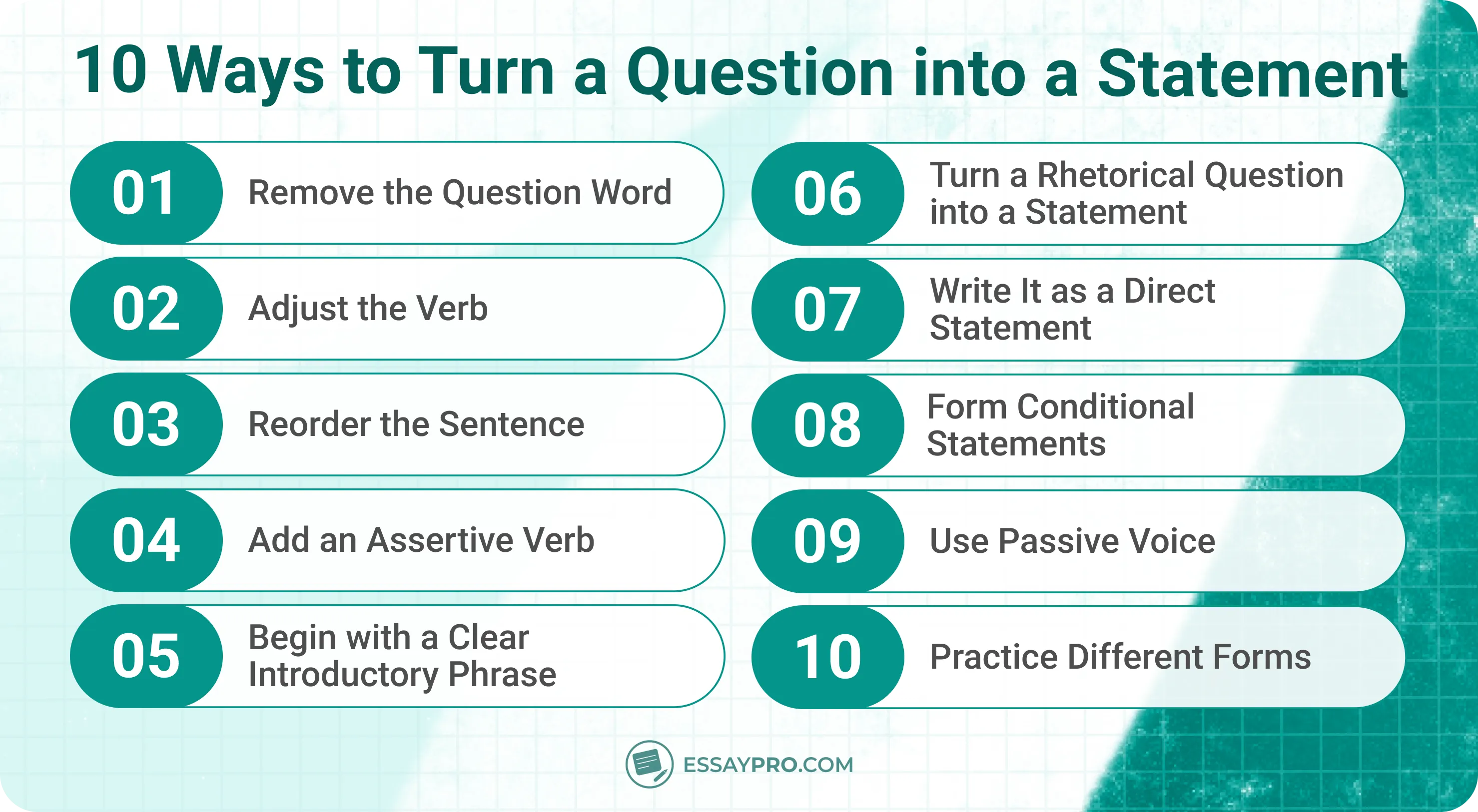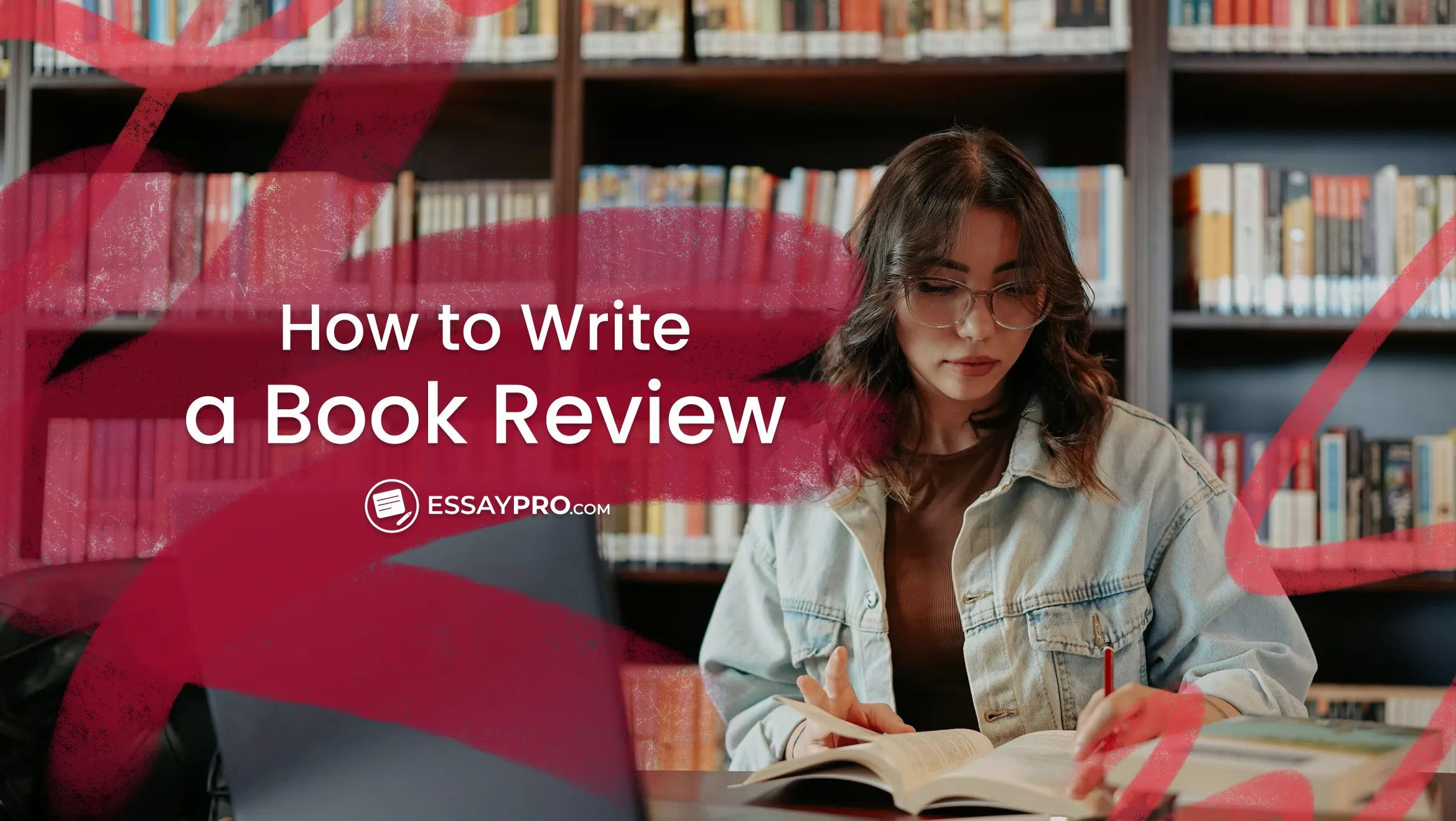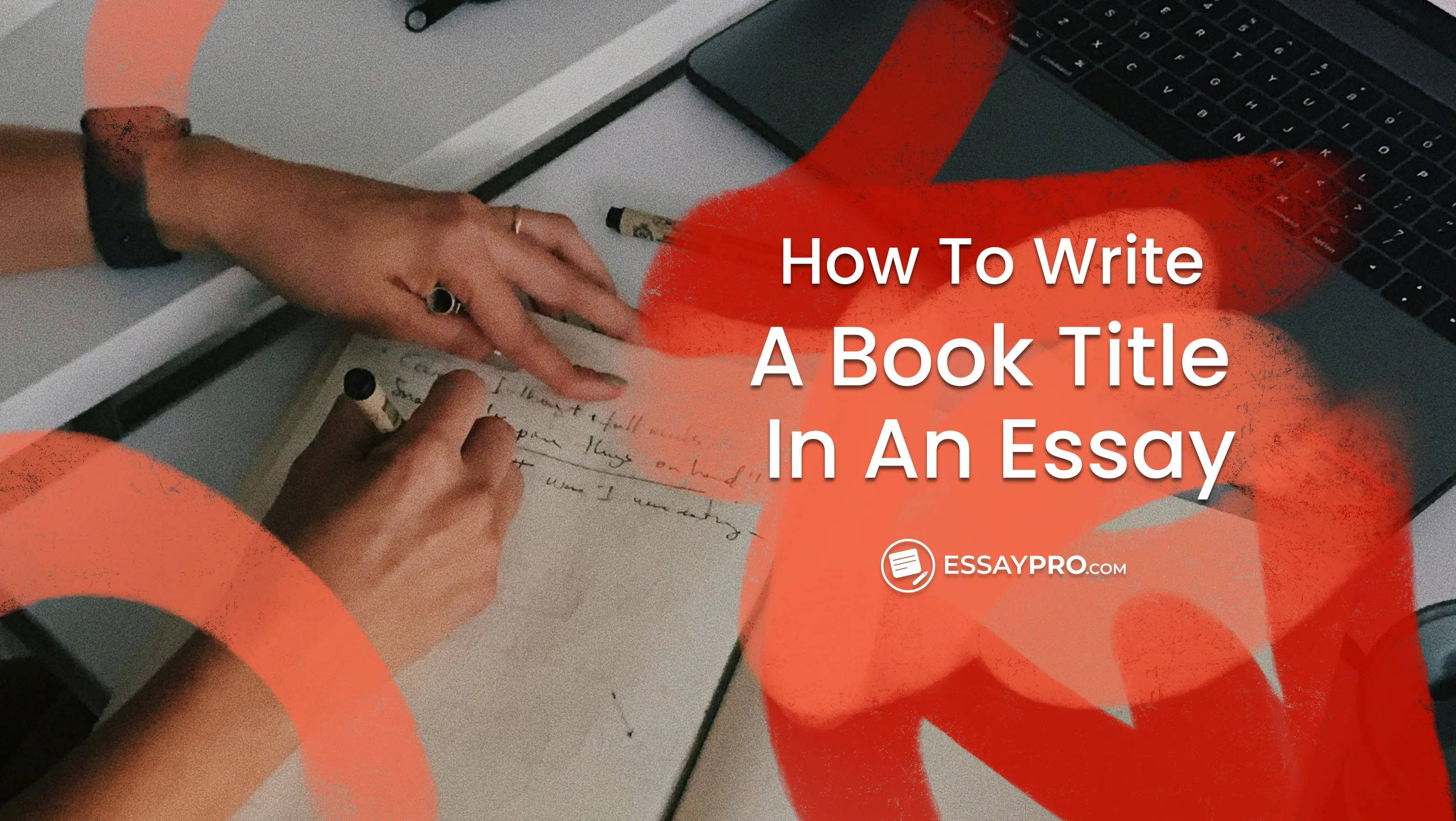Students often get stuck on prompts that sound too much like questions waiting for a response. That’s when they need to rephrase questions into statements to write with more confidence. Once you understand how to turn questions into solid statements, your writing will become more purposeful. At that point, the reader can stop guessing because you guide them through the main point of your paper.
If this still feels tricky after seeing the examples in our article, EssayPro can step in. Our platform offers the right kind of guidance for all kinds of academic tasks. So, even if you're looking for skilled personal statement writers, help is just a few clicks away.


Why to Change a Question into a Statement?
A question invites speculation. A statement delivers a clear idea that the reader can easily understand. Changing questions into statements makes your writing more assertive. It allows you to easily build strong thesis statements and develop more logical arguments. Let's look at a specific example:
'Why is time management important for students?':
This form leaves the reader waiting for an answer. But when you turn it into a concrete statement, like:
'Time management is essential for student success.' You give them an answer immediately.
How to Turn a Question into a Statement: 10 Practical Ways
You need a guide on turning questions into statements for stronger academic writing. Sometimes that means reordering the structure or removing the question word altogether. Other times, you'll need to add a declarative verb to make the sentence sound complete. The techniques below help you build confident arguments that hold their ground.

1. Remove the Question Word at the Beginning
A question word signals doubt, like the sentence is waiting for an answer. The thought instantly becomes direct once you remove that single word. So, restate the idea in your own words so you can be sure the point is clear.
2. Adjust the Verb to Fit a Statement
Some questions need helping verbs such as do or can. Like question words, these verbs also create space for doubt. Replace them with a single main verb that follows correct verb agreement. Don't forget to also check the verb tense to make sure it fits the context correctly.
If you need to describe your goals in just a couple of pages, learn how to build a statement of purpose format.
3. Reorder the Sentence Structure
A question usually starts with a verb. A statement begins with a subject. Moving those parts around and converting questions to statements changes how the sentence feels. You go from asking to explaining. That small shift in word order turns an open prompt into a complete idea.
4. Add a Verb That Asserts a Point
Some ideas need a stronger push. When you rephrase questions, add a verb that clarifies what the sentence is doing. Words like shows or demonstrates give structure to the thought. They move the writing toward meaning rather than hesitation. This method is useful when changing questions in a research paper where precision matters.
5. Begin with a Clear Introductory Phrase
Start with a short phrase when a topic feels too broad. Introductions such as The evidence shows that or Research suggests that help create focus. They give the sentence a starting point and show you understand the context.
6. Turn a Rhetorical Question into a Statement
A rhetorical question already contains its own answer. It pushes the reader to agree without asking them to respond. To transform a question, restate that same claim in declarative language. This method works well when you want to express a shared truth.
7. Write It as a Direct Statement
When the sentence asks something directly, convert it into a fact. Take away the question mark and form a concrete statement. Say what you mean without hesitation. This shows that you're guiding the discussion, not leaving it open-ended.
8. Form Conditional Statements
Some ideas rely on cause and effect. Turn these into conditional statements that show one action leading to another. Begin with if or when to show the connection. This approach works when you need to clarify logic, especially in a research paper or classroom explanation.
9. Frame It in Passive Voice
The focus belongs to the action in certain cases instead of the person who performed it. Passive voice helps you in those moments when you're rephrasing questions. This form puts emphasis on the result and keeps attention on the main concept rather than the actor. It fits formal contexts where outcomes are more important than individual roles.
Check out our guide on how to write a good personal statement if you're trying to strengthen your college application.
10. Practice and Explore Different Forms
Skill grows with use. Try turning questions into statements through several approaches. Adjust the verb tense in one attempt. In another, experiment with word order or rephrasing. Each new sentence teaches you more about clarity. Over time, these small exercises help you express ideas with precision.
What to Avoid When Turning a Question into a Statement?
Precision matters most of all when you rephrase the question. A rushed rewrite can distort the entire meaning. Each adjustment you make should show awareness of the structure and purpose, which isn't always easy. Here are some pitfalls to avoid:
- Leaving the question word in place. If why or how remains, the sentence keeps its uncertain tone. Remove the word completely before turning it into a statement.
- Forgetting verb agreement. After reworking the sentence, confirm that the subject and verb still agree in number and tense.
- Mixing direct and indirect forms. Don't open with a statement and end with a question tone. The form should stay consistent from start to finish.
- Overusing filler phrases. Avoid unnecessary starters like I think or It seems. They reduce clarity and weaken authority.
- Altering meaning by mistake. Each rewrite should reflect the same intent as the original question. If it shifts the idea, rebuild the sentence until it aligns.
Final Thoughts
Rewriting questions into statements strengthens your control over tone and structure. It helps you deliver ideas with confidence and remove uncertainty from your writing. Every rewrite you complete improves focus and precision.
If you need some extra guidance on your academic papers, EssayPro can step in as a reliable space for students. You can even buy personal statement for cheap, tailored perfectly to reflect your own voice.
FAQ
How to Change a Question into a Statement?
Start by finding the main idea hidden inside the question. Remove the question word so the sentence shifts from inquiry to claim. Then adjust the verb tense and place the subject at the beginning. Read the line aloud. If it sounds informative rather than speculative, your rewrite works.
What's the Simplest Way to Turn a Yes/No Question into a Statement?
Look at the verb that opens the question. When it begins with is, do, or does, place the subject first and drop the question mark. This small change turns an open question into a direct statement. Example: Is this strategy effective? becomes This strategy is effective.
What Are a Few Examples of Questions Rewritten as Statements?
These examples show how a single edit can shift the sentence from uncertain to clear.
- Why is sleep important? → Sleep is important for health.
- Does reading help students learn faster? → Reading helps students learn faster.
- How can practice improve grammar? → Practice improves grammar when used consistently.

Ana Ratishvili
Ana is a professional literary writer with a Master’s Degree in English literature. Through critical analysis and an understanding of storytelling techniques, she can craft insightful guides on how to write literary analysis essays and their structures so students can improve their writing skills.
- Change statements into questions. https://www.englishpractice.com/. (n.d.). https://www.englishpractice.com/quiz/change-statements-questions/
- Cambridge University Press & Assessment. (n.d.). Questions: statement questions (you’re over 18?). In English Grammar Today. https://dictionary.cambridge.org/grammar/british-grammar/questions-statement-questions-you-re-over-18
- Dorling Kindersley Limited. (2010). English Made Easy [PDF]. GreatSchools. https://www.greatschools.org/library/cms/63/22763.pdf








